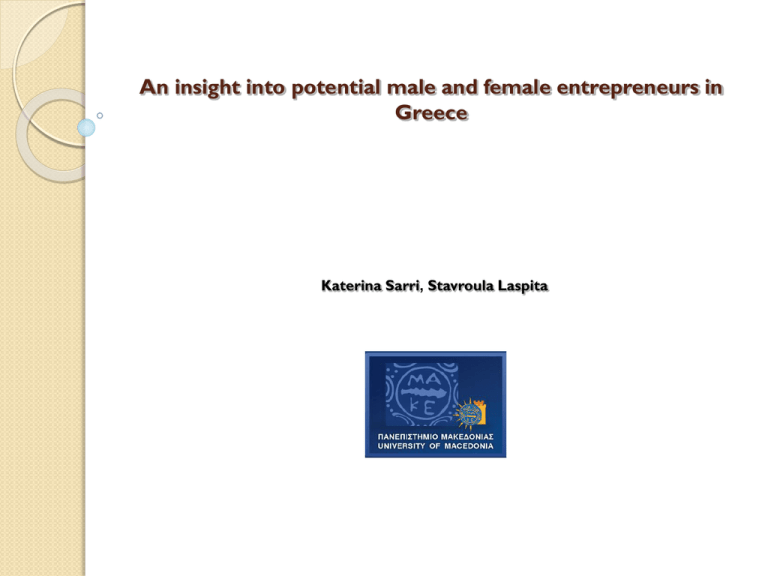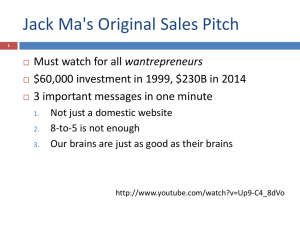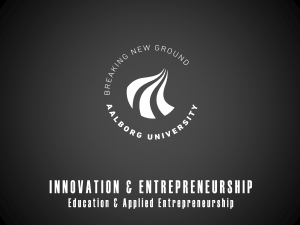An insight into potential male and female entrepreneurs in
advertisement

An insight into potential male and female entrepreneurs in Greece Katerina Sarri, Stavroula Laspita Ongoing financial crisis In Greece financial aspect social aspect psychological aspect 1 Entrepreneurship structural change competition innovation job creation 2 creation of a new business Entrepreneurial culture entrepreneurial values 3 Literature Review Entrepreneurship education in universities Many universities offer a number of entrepreneurship courses and programs, support endowed chairs of entrepreneurship (Katz, 2003; Kuratko, 2005) Research provides a somewhat inconclusive picture (Kolvereid and Moen, 1997; Oosterbeek et al., 2010; Weber et al., 2009) whether entrepreneurship education at the university level: triggers the entrepreneurial intention of students triggers motives towards entrepreneurship affects students’ business goals affects male and female students differently towards entrepreneurship 4 Introduction Entrepreneurial intention Motives Business goals 5 Introduction Female Entrepreneurship There is a gender gap in the entrepreneurial activity (Kelly et al., 2010) Female entrepreneurship is considered to be an important source of growth, employment, and innovation (Birley, 1989, Mueller, 2004, Verheul and Thurik, 2001) 6 Problem definition In Greece there are very few studies that examine: The entrepreneurial potential of Greek students (intention, activity, motives, business goals) The entrepreneurial spirit in Greek universities (e.g. offers in entrepreneurship) Gender similarities or differences among potential young entrepreneurs 7 Our study focuses on the population of potential entrepreneurs (students) sheds a light on students’ founding intention and activity examines students’ entrepreneurial motives and business goals the entrepreneurial spirit in universities examines the above mentioned aspects through the gender lens 8 Sample characteristics 284 participants Age (mean) 23,2 Undergraduate, BA-level (%) 61,6 Graduate, MA-level (%) 21,5 PhD-level (%) 16,9 Male (%) 37,0 Female (%) 63,0 Business-related sciences (%) 43,0 Natural sciences (%) 3,2 Social sciences (%) 43,7 Other fields of study (%) 10,2 9 Results Figure 1: Aggregated career aspirations directly after graduation Female INT 75,9 Male INT 76,4 Female GRE 75,1 Male GRE 15,1 16,9 11,9 69,9 0% 10% 20% Dependent occupation 30% 18,4 40% 1,2 7,8 50% Independent occupation 60% 70% No employment 0,6 6,1 1,1 11,9 2,9 80% 8,7 90% 100% Do not know 10 Results Figure 2: Aggregated career aspirations five years after graduation Female INT 47,2 Male INT 40,6 47,0 Female GRE 10% 20% Dependent occupation 0,73,4 35,4 45,6 0% 8,8 45,4 56,2 Male GRE 6,9 1,7 6,7 48,5 30% 40% 50% Independent occupation 60% 70% No employment 1,04,9 80% 90% 100% Do not know 11 Results Entrepreneurial intentions and activity (%) Male Female No, never 21.0 38.5 Yes, briefly 24.8 20.1 Yes, quite specifically 16.2 17.3 Yes, but I dropped the idea 10.5 11.2 23.8 11.7 Yes, I am just starting to do so 1.9 1.1 Yes, I am already self-employed 1.0 0.0 Yes, I was self-employed, but no longer am 1.0 0.0 Yes, I am determined to become self-employed in the future 12 Results Entrepreneurial motives (AM) Male Female 3.81 3.69 3.57* 3.87* 3.49 3.69 3.04 3.08 3.12 2.83 Earn a larger personal income 3.98 3.88 Financial security 4.16 4.11 Build great wealth, high income 3.92 3.76 Build a business my children can inherit To continue a family tradition Follow example of a person I admire To be respected by my friends 3.03* 2.42* 2.20* 1.74* 2.32 2.11 2.19 2.01 Innovative, be at the forefront of technology 2.75* 2.31* To develop an idea for a product 2.93* 2.45* Achieve something, gain recognition 3.34 3.16 Gain a higher position for myself 3.36 3.30 Get greater flexibility for personal life 3.52 3.61 Free to adapt my approach to work 3.86 3.81 To challenge myself To fulfil a personal vision Grow and learn as a person To lead and motivate others Power to influence an organization Notes: male sample n=103, female sample n=179, scale used: from 1= to no extent to 5= to a very great extent, * significance (2-tailed) at13 0.05 level Results Business goals (AM) Male Female Net Profit over 5 years 4.16 4.05 Rate of growth 4.22 4.16 Market share 3.88 3.77 Employee rewards and benefits 3.06* 3.45* Net profit over the coming year 3.82 3.85 Company prestige 4.36 4.47 Innovation 3.95 4.14 Assets and reserves 3.63 3.72 Dividend pay out 3.25* 3.53* Price leadership 3.42 3.58 Services to community 3.37* 3.66* Notes: male sample n=83, female sample n=110, scale used: from 1= not at all important to 5= extremely important, * significance (2-tailed) at 0.05 level ** significance (2-tailed) at 0.01 level 14 Results Importance of university offers (AM) Male Female Business plan project seminars 4.28 4.45 Start-up coaching 4.54 4.80 Entrepreneurship seminars and lectures 4.15 4.28 Start-up business games / start-up simulations 4.09 4.26 Regular round tables for founders (e.g. exchange of 4.20 4.20 Contacts for general questions 4.13 4.17 Start-up financing through the university 4.76 4.76 Incubators (service centre for early stage start-ups) 4.34* 4.67* experiences) Notes: male sample n=105, female sample n=179, scale used: from 1= very unimportant to 6= very important, * significance (2-tailed) at 0.05 level ** significance (2-tailed) at 0.01 level 15 Results Existence of university offers (%) Male Yes No Female Don’t Yes No know Don’t know Business plan project seminars 23.8 24.8 51.4 33.5 25.7 40.8 Start-up coaching 14.3 36.2 49.5 16.2 34.6 49.2 Entrepreneurship seminars and lectures 54.3 17.1 28.6 59.8 15.6 24.6 18.1 33.3 48.6 11.2 41.3 47.5 17.1 40.0 42.9 10.6 38.0 51.4 Contacts for general questions 41.9 20.0 38.1 39.1 22.3 38.5 Start-up financing through the university 7.6 28.6 63.8 3.9 31.8 64.2 7.6 23.8 68.6 2.8 31.3 65.9 Start-up business games / start-up simulations Regular round tables for founders (e.g. exchange of experiences) Incubators (service centre for early stage start-ups) 16 Summary - Discussion Entrepreneurial intention Do male and female students differ in their founding intention in Greece? • Men seem to have a higher interest in becoming self-employed. • Gender gap not only in entrepreneurial activity but also in entrepreneurial intentions. • Measures need to be taken to raise female’s interest in entrepreneurship. 17 Summary - Discussion Entrepreneurial intention Do male and female students differ in their founding intention in Greece? • Entrepreneurial intentions increase for both male and female students five years after graduation. Possible explanations: o Working experience could provide students with a more realistic picture of what it means to be an entrepreneur. o Students would like to first gain experience working as employees that will enhance their knowledge of how to run a business. o Entering the workforce may provide security and comfort that delay exercising an interest in entrepreneurship. 18 Research Questions Entrepreneurial motives Do male and female students differ in their motivation towards entrepreneurship in Greece? • Only small significant differences could be between the two gender in motives for becoming self-employed. • Small differences are also found between the two gender in the literature of existing entrepreneurs (Brush, 1992; Birley, 1989) • If both potential and existing male and female entrepreneurs do not mainly differ in their motivation to become self-employed, the question of the gender gap in the entrepreneurial activity still remains open and is subject to future research 19 Research Questions Business goals Do male and female students differ in their business goals in Greece? • Small significant differences were found in the business goals. • Women would like to pursue social goals like services to the community but also financial goals like the pay out of dividends. 20 Research Questions Entrepreneurship education Does entrepreneurship education affect male and female students differently? • Female students value almost all university offers more than their male counterparts. • Significant differences were found only for incubators. • A large number of students (males and females) do not know whether the examined services exist in their universities. Why??? o Students of all disciplines o Universities do not publicize at a great extent their offers in entrepreneurship o students’ founding intention is not yet strong enough to mobilize them to acquire information 21 Future research research on entrepreneurship education should be extended in primary and secondary schools the factors that lead to the gender gap in entrepreneurship still remain open longitudinal studies are needed to examine: owhether students’ intention to become self-employed has been realized or not othe temporal stability of entrepreneurial intentions and factors that affect it ohow entrepreneurship education indirectly influences entrepreneurial intention 22 Thank you very much for your attention Questions-Comments 23








